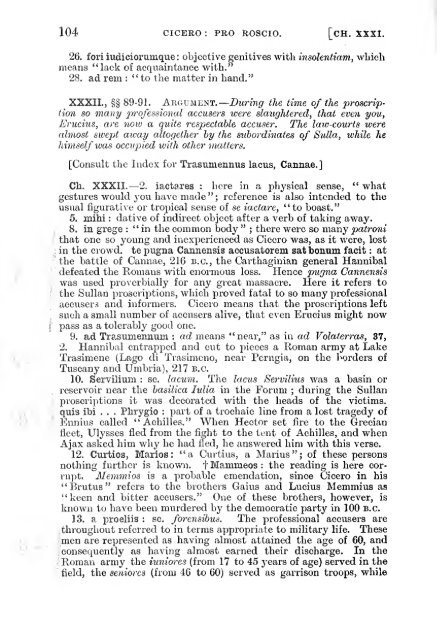Pro S. Roscio Amerino
Pro S. Roscio Amerino
Pro S. Roscio Amerino
You also want an ePaper? Increase the reach of your titles
YUMPU automatically turns print PDFs into web optimized ePapers that Google loves.
104 CICEEO : PRO ROSCIO. [cH. XXXI.<br />
26. fori iudiciorumque : objective genitives with insolentiam, wbicli<br />
means "lack of acquaintance with."<br />
28. ad rem " : to the matter in hand."<br />
XXXII. , §§ 89-91. Aruument.—Dztrmp' the time of the proscription<br />
so many professional acciLsers were slaughtered, that even you,<br />
Erucius, are now a quite respectable accuser. The law-courts were<br />
almost swept away altogether by the stibordinates of Sulla, while he<br />
himselfwas occupied with other matters.<br />
[Consult the ludex for Trasumennus lacus, Cannae. ]<br />
Ch. XXXII.—2. iactares : here in a physical sense, " what<br />
gestures would j'ou liave niade " ; reference is also intcnded to thc<br />
usual figurative or tropical sense of se iactare, " to boast."<br />
5. mihi : dative of indirect object after a verb of taking away.<br />
8. in grege : " in the conimon body " ; there werc so many patroni<br />
that one so young and inexperienced as Cicero was, as it were, lost<br />
in tlie ciowd. te pugna Cannensis accusatorem sat bonum facit : at<br />
„the battle of Cannae, 216 b.c, the Carthaginian general Hannibal<br />
|l "X If defeated the Romans wlth enormous loss. Hence pugna Cannensis<br />
"<br />
was used proverbially for any great massacre. Here it refers to<br />
I'<br />
the Sullan proscrij)tions, which proved fatal to so many professional<br />
I';<br />
J!' accusers and informers. Cicero means that the proscriptions left<br />
such a small number of accusers alive, that even Ei-ucius might now<br />
I<br />
f pass as a tolerably good one.<br />
9. ad Trasumennum : ad means "near," as in ad Volaterras, 37,<br />
2. Hannibal entrapped and cut to pieces a Roman army at Lake<br />
»<br />
i<br />
J<br />
'<br />
Trasimene (Lago di Trasimeno,<br />
Tuscany and Umbria), 217 B.c.<br />
near Perugia, on the borders of<br />
10. Servilium : sc. lacum. Tlie lacus Servilius was a basin or<br />
•i reservoir near the basilica lulia in the Forum ; during the SuUan<br />
^ 1 pi-oscriptions it was decorated with the heads of the victims.<br />
' f^ quis ibi . . . Phrygio : part of a trochaie line from a lost tragedy of<br />
I<br />
l^ "* I Ennius called "Achilles." When Hector set fire to the Grecian<br />
fleet,<br />
I<br />
Ulysses fled from the fight to the tent of Achilles, and when<br />
:" Ajax asked him why he had fled, he answered him with this verse.<br />
12. Curtios, Marios: "a Curtius, a Marius"; of these persons<br />
nothing further is known. + Mammeos : the reading is here corrupt,<br />
Memmios is a probable emendation, since Cicero in his<br />
"Brutus" refers to the brothers Gaius and Lucius Memmius as<br />
"keen and bitter accusers." One of these brothers, however, is<br />
known to have been murdered by the demoeratic party in 100 b.c.<br />
13. a proeliis : sc. forcnsibus. The professional accusers are<br />
j,<br />
Ithroughout referred to in terms appropriate to military life. These<br />
^! "^ Imen are represented as having almost attained the age of 60, and<br />
" *" '<br />
-jconsequently as having almost earned their discharge. In the<br />
t-Roman army the iuniores (from 17 to 45 j'ears of age) served in the<br />
^-field, the seniores (from 46 to 60) served as garrison troops, while

















